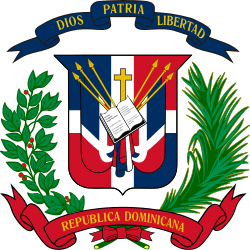Country Alliance (Dominican Republic)
The Country Alliance (Spanish: Alianza País, ALPAÍS) is a political party in the Dominican Republic.
Country Alliance Alianza País | |
|---|---|
 | |
| President | Guillermo Moreno |
| Founded | 20 February 2011 |
| Headquarters | Pasteur Avenue 55, Santo Domingo, Dominican Republic |
| Ideology | Duartianism Social democracy Democratic socialism Progressivism |
| Political position | Centre-left |
| Colors | Turquoise and Yellow Lemon |
| Slogan | ¡Por un gobierno honesto! (For an honest government!) |
| Chamber of Deputies | 1 / 190 |
| Senate | 0 / 32 |
| Mayors | 0 / 155 |
| Website | |
| www | |
 |
|---|
| This article is part of a series on the politics and government of the Dominican Republic |
|
|
Legislature |
|
|
|
Administrative divisions |
|
|
|
History
The party was established on 15 October 2009, and was recognised by the Central Electoral Commission on 3 February 2011.[1] It nominated Guillermo Moreno García as its candidate in the 2012 presidential elections. Although he finished third, he received only 1.4% of the vote.[2] Moreno was the party's presidential candidate again in the 2016 general elections, in which he finished third with 1.8% of the vote.[3] In the Congressional elections, the party won a seat in the Chamber of Deputies.[4]
Ideology
The ideological principles of the Country Alliance (also known as "guiding principles") revolve around the tendencies of progressivism and center-left in the traditional political spectrum, although in the Dominican Republic political parties aren't usually identified under a hard and pure ideological line.
These guiding principles are raised in 9 basic points, which are:
- The Equality legal and social of all human beings, without discrimination of social, economic, race, sex, gender, nationality, age, cultural identity, health status, disability, sexual orientation, religion, political or philosophical ideas.
- The democracy participatory and pluralist as the best form of government and social organization known to man.
- The freedom political, economic and social of human beings, especially civil and political freedoms, as a transversal axis for the construction of a new citizenship.
- Social justice, that is, equity and solidarity, as the main engine of economic relations in society.
- The State under a constitutional regimen of rights, guarantees and freedoms in favor of human beings and their coexistence, and against personalism, caudillism, privileges, corruption and impunity
- The legality and the rule of law as fundamental rectors of coexistence between individuals, as well as the relationship between individuals and the State.
- The attachment to the ethics of the rulers and powerful, denying the rupture between ethical principles and political practice.
- Respect for the sovereignty and independence of all foreign powers.
- International relations based on mutual respect, peace, cooperation, and the self-determination of peoples.
As a consequence of these principles, the Alianza País speech is based heavily on criticism of corruption and impunity (hence its motto "For an honest government!"), with respect to environment (especially against open pit mining and mega-mining), to the inclusion of marginalized groups (mainly women, the elderly and youth) and respect and tolerance towards Haitian Immigrants and LGBT collectives.
In accordance with the objectives of the party, the ultimate goal of Alianza País is the establishment of the Duartian Republic, a concept linked to compliance with the guiding principles mentioned above, as it would have established in its nation project the father of the Dominican homeland Juan Pablo Duarte.
Structure and organization
Country Alliance has a mass political party structure, whose base of action may be party members, or supporters (also called "friends of Alianza País"). The "friend" has a voice, but no vote, in the decisions of the party.
The Country Alliance structure is composed of three types of organizations. These are backed by the statutory rules of the party, and correspond very diffusely to the functions of the political power of citizens. These three types of organisms are:
- Organisms of political leadership: are responsible for the organizational work, recruitment, promotion and construction of the party. They are the "executive" branch of the party.
- The territorial nucleus, composed of a number between 7 and 15 members. It is the minimum unit of the party in a neighborhood, urbanization, sector or place.
- The sectorial nucleus, composed of at least 7 members belonging to the same sector of society (sexual, labor, professional, generational ...).
- The zonal council, composed of at least three territorial and / or sectorial nuclei. It is the intermediary body between the territorial / sectoral nucleus and the municipal coordination team.
- A municipal coordination team for each municipality in the country; composed of between 7 and 25 members, who are the general coordinators and / or organizational secretaries of the zonal councils of said municipality.
- A provincial council for each province of the country and for the National District; integrated by the general coordinators and / or organizational secretaries of the municipal teams of said province (in the case of the National District, by). There is also a council for Dominican communities abroad.
- The national leadership, formed by the President, the Executive Secretary and the general coordinators of provincial and National District councils, in addition
References
- Alianza Pais Camara de Cuentas
- Dominican Republic IFES
- Dominican Republic IFES
- Last elections IPU